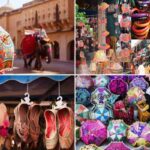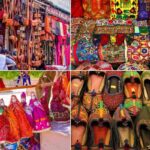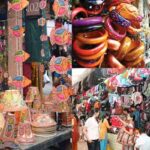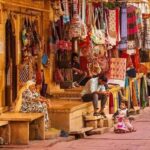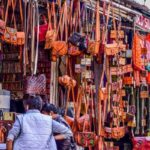What and Where to Shop in Jaipur, known as the Pink City, is a vibrant hub of traditional crafts and exquisite textiles. One of the must-visit places is Johari Bazaar, renowned for its stunning jewelry. Here, you’ll find an array of gemstones, silver ornaments, and Kundan Meena jewelry, showcasing Rajasthani artistry.
For textiles, head to Sanganer Village, a short drive from the city center. It’s a treasure trove of block-printed fabrics, including vibrant sarees, bedspreads, and garments. Anokhi and FabIndia are reputable stores in Jaipur, offering a wide range of handcrafted textiles, clothing, and home decor.
If you’re into pottery and ceramics, head to the nearby town of Bagru. This place is famous for its hand-block printing and pottery traditions. You can pick up intricately designed clayware and beautifully printed fabrics Jaipur Tour Packages.
Don’t forget to explore the local markets like Bapu Bazaar and Nehru Bazaar for a mix of textiles, handicrafts, and souvenirs. These markets offer a bustling, authentic shopping experience.
Lastly, a visit to Jaipur wouldn’t be complete without exploring the Rajasthali Government Emporium. It’s a one-stop shop for a wide array of traditional Rajasthani crafts, including textiles, jewelry, and handicrafts, all certified for their authenticity.
In summary, Jaipur offers a rich tapestry of shopping experiences, from jewelry in Johari Bazaar to textiles in Sanganer Village and everything in between. Happy shopping!

Johari Bazaar
Johari Bazaar is a bustling market located in the heart of Jaipur, Rajasthan, India. It is renowned worldwide for its exquisite collection of jewelry, making it a must-visit destination for shoppers and admirers of fine craftsmanship. The name “Johari” literally translates to “jeweler,” emphasizing the market’s specialization in all things related to jewelry.
The bazaar is a labyrinth of narrow, winding lanes adorned with shops and stalls, each displaying a mesmerizing array of gemstones, gold, silver, and Kundan Meena jewelry. Kundan Meena, a traditional Rajasthani jewelry style, is particularly prominent in Johari Bazaar, showcasing the exceptional artistry of local craftsmen Jaipur Attractions.
Visitors can explore a wide range of jewelry designs, from intricately detailed necklaces to elegant earrings and ornate bangles. Precious and semi-precious gemstones like diamonds, emeralds, rubies, and sapphires are meticulously set into exquisite pieces, reflecting the skill and creativity of the artisans.
Aside from the dazzling jewelry, Johari Bazaar also offers an assortment of other items including traditional clothing, fabrics, and accessories. Visitors can find beautifully embroidered garments, traditional Rajasthani turbans, and ornamental trinkets that add a touch of local flair to any ensemble.
Beyond its commercial significance, Johari Bazaar also provides a glimpse into the cultural heritage of Jaipur. The market’s architecture exudes a traditional Rajasthani charm, with intricately designed facades and ornate doorways. The vibrant atmosphere, coupled with the warm hospitality of the shopkeepers, creates an unforgettable shopping experience Jaipur Tourism.
In essence, Johari Bazaar is a treasure trove for jewelry enthusiasts and a cultural gem for anyone seeking an authentic Rajasthani shopping adventure. It encapsulates the rich artistic traditions of Jaipur and stands as a testament to the city’s enduring legacy in the world of craftsmanship and design.
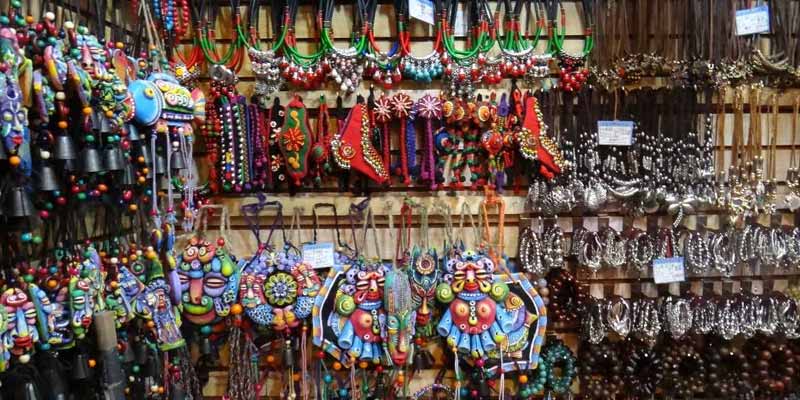
Bapu Bazaar
Bapu Bazaar, located in the heart of Jaipur, is a bustling and vibrant market that offers a diverse array of goods, making it a prime destination for both locals and tourists. This market is named after Mahatma Gandhi, often affectionately referred to as “Bapu,” and it exudes a lively, traditional Indian bazaar atmosphere.
The market is famous for its extensive collection of textiles, including sarees, fabrics, and dress materials. Visitors can explore an array of beautifully crafted garments, ranging from traditional Rajasthani attire to modern, contemporary clothing. Intricate block prints, vibrant tie-dye patterns, and elaborate embroideries are some of the hallmarks of the textiles available here.
In addition to clothing, Bapu Bazaar also hosts a wide range of handicrafts and souvenirs. Items such as hand-carved wooden figurines, brassware, pottery, and Rajasthani puppets are popular among shoppers looking to take home a piece of Jaipur’s rich cultural heritage.
One of the distinctive features of Bapu Bazaar is its accessibility and affordability. The market caters to a wide range of budgets, making it an inclusive shopping destination for all. Visitors can hone their bargaining skills while interacting with the friendly local vendors.
Furthermore, Bapu Bazaar is not only a shopping haven but also a sensory delight. The market is replete with the fragrances of traditional Indian spices, the vibrant colors of textiles and handicrafts, and the energetic hum of shoppers and vendors.
In essence, Bapu Bazaar encapsulates the essence of Jaipur’s vibrant culture and artistic heritage. It offers a unique shopping experience that celebrates the diversity and craftsmanship of this historic city, making it a must-visit destination for those seeking an authentic taste of Jaipur.
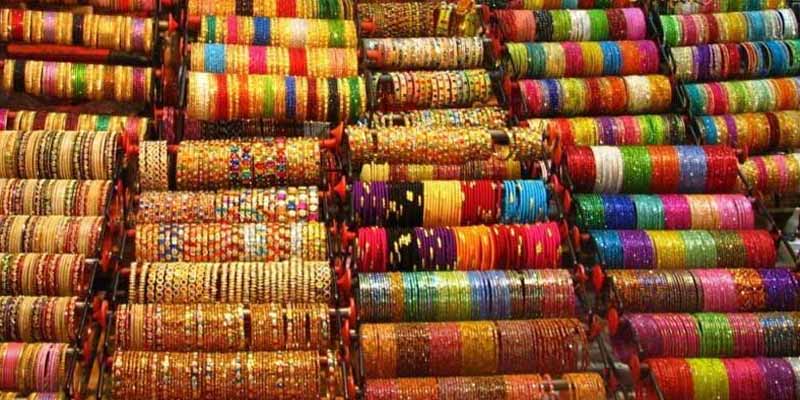
Tripolia Bazaar
Tripolia Bazaar is a historic market located in the heart of Jaipur, Rajasthan, India. Named after the famous Tripolia Gate, which stands adjacent to it, this market is a treasure trove of traditional Rajasthani goods and handicrafts.
The market is renowned for its wide selection of brassware, copper utensils, and intricately designed ironware. Visitors can explore an array of items including ornate lamps, utensils, and decorative pieces that showcase the exquisite metalwork craftsmanship of the region.
One of the standout features of Tripolia Bazaar is its collection of beautiful lac jewelry. Lac is a resin-like substance extracted from the secretions of an insect, and it is meticulously shaped into intricate jewelry pieces. The vibrant colors and delicate designs of lac jewelry make it a unique and sought-after souvenir for visitors.
Additionally, the market is a haven for textile enthusiasts. Visitors can find a range of fabrics, including vibrant Bandhani and Leheriya sarees, which are traditional tie-dye techniques native to Rajasthan. These textiles are known for their bright colors and intricate patterns, reflecting the rich cultural heritage of the region.
Tripolia Bazaar is also known for its marble and stone carvings. Skilled artisans create stunning sculptures, idols, and decorative items from locally sourced marble, showcasing the city’s expertise in stone craftsmanship.
The market’s proximity to the historic City Palace and Hawa Mahal adds to its appeal, making it a convenient stop for tourists exploring the city’s heritage sites.
Overall, Tripolia Bazaar offers a glimpse into Jaipur’s artistic traditions and cultural heritage. Its unique collection of handicrafts, textiles, and jewelry makes it a must-visit destination for those seeking to immerse themselves in the vibrant and diverse culture of Rajasthan.
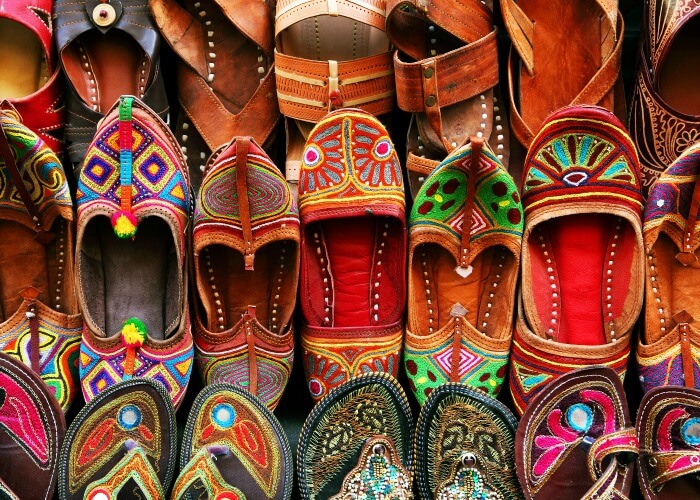
Nehru Bazaar
Nehru Bazaar, located in the heart of Jaipur, is a bustling market known for its diverse array of goods, making it a popular destination for both locals and tourists. Named after India’s first Prime Minister, Jawaharlal Nehru, this market embodies the spirit of traditional Indian bazaars.
The market is renowned for its leather goods, particularly shoes, bags, belts, and jackets. Skilled artisans craft high-quality leather products in various styles, catering to different tastes and preferences. Visitors can find a wide range of designs, from classic to contemporary, making Nehru Bazaar a must-visit for leather enthusiasts.
One of the standout features of Nehru Bazaar is its collection of textiles, including fabrics, scarves, and traditional Rajasthani garments. The market is a treasure trove for textile lovers, offering a vibrant array of colors, patterns, and textures that showcase the rich textile heritage of Jaipur.
In addition to leather and textiles, Nehru Bazaar also hosts a variety of other items. Visitors can explore jewelry, handicrafts, and souvenirs, providing ample opportunities to take home a piece of Jaipur’s cultural legacy.
Nehru Bazaar is known for its friendly and welcoming shopkeepers, creating a warm and inviting atmosphere for visitors. Bargaining is a common practice here, allowing shoppers to engage in the lively and interactive shopping experience that is characteristic of Indian markets.
The market’s central location, close to popular tourist spots like Hawa Mahal and City Palace, makes it easily accessible for those exploring Jaipur’s historical sites.
In essence, Nehru Bazaar offers a vibrant and diverse shopping experience that celebrates the craftsmanship and cultural heritage of Jaipur. It is a must-visit destination for those seeking to immerse themselves in the lively and colorful atmosphere of Rajasthan’s capital city.
Chandni Chowk
Chandni Chowk in Jaipur is a bustling and vibrant market, named after its more famous counterpart in Delhi. This market, located in the heart of the Pink City, offers a unique blend of traditional Rajasthani culture and modern shopping experiences.
Chandni Chowk is renowned for its extensive collection of textiles, fabrics, and clothing. Visitors can explore a wide range of garments, from traditional Rajasthani attire like Bandhani and Lehenga Choli to contemporary clothing. The market is also famous for its exquisite sarees, known for their intricate designs and vibrant colors.
In addition to textiles, Chandni Chowk offers a variety of other items. The market is a hub for jewelry, offering an assortment of beautifully crafted pieces, including Kundan, Meenakari, and Polki jewelry. Visitors can also find handicrafts, traditional footwear, and home decor items that showcase the rich cultural heritage of Rajasthan.
One of the highlights of Chandni Chowk is its delectable street food. The market is a food lover’s paradise, with numerous stalls and eateries serving local Rajasthani delicacies like pyaaz kachori, mirchi bada, and various chaats. It’s an excellent place to savor the flavors of Jaipur.
The vibrant and bustling atmosphere of Chandni Chowk is a sensory delight. The market is filled with the aroma of spices, the vibrant colors of textiles and jewelry, and the lively chatter of shoppers and vendors. It’s an excellent place to immerse oneself in the local culture and traditions.
Chandni Chowk’s central location, near iconic landmarks like Hawa Mahal and City Palace, makes it a convenient stop for tourists exploring the city. It offers an authentic and immersive shopping experience, allowing visitors to take home a piece of Jaipur’s rich and colorful heritage.
Sireh Deori Bazaar
Sireh Deori Bazaar, nestled near the historic Hawa Mahal in Jaipur, is a charming market steeped in history and culture. This market derives its name from the Sireh Deorhi Gate, one of the prominent entrances to the City Palace complex.
This bazaar is a hidden gem for those seeking traditional Rajasthani crafts and artifacts. It specializes in a variety of items, including antiques, handicrafts, jewelry, textiles, and souvenirs. Visitors can explore an array of beautifully crafted goods, from exquisite handwoven fabrics to intricately designed silver jewelry.
The market is particularly famous for its antique shops, where collectors and enthusiasts can find a range of vintage items, including furniture, sculptures, and unique curios. These pieces often hold a rich history, providing a glimpse into Rajasthan’s cultural past.
Sireh Deori Bazaar also boasts a vibrant collection of traditional Rajasthani turbans, known as “pagdis.” These colorful headpieces are an integral part of Rajasthan’s cultural attire and come in a dazzling array of styles and patterns.
Apart from its crafts and textiles, the market is home to a variety of street food stalls and vendors. Visitors can sample local snacks like kachoris, samosas, and sweets, adding a delightful culinary experience to their shopping excursion.
The bazaar’s proximity to key landmarks like Hawa Mahal and the City Palace makes it a convenient stop for tourists exploring the historical heart of Jaipur. The market’s narrow, winding lanes and historic architecture add to its old-world charm, creating a picturesque setting for shopping and exploration.
In essence, Sireh Deori Bazaar offers a unique and enriching shopping experience, combining the allure of Rajasthani craftsmanship with the historical backdrop of Jaipur. It’s a must-visit destination for those seeking authentic cultural treasures and a taste of the city’s vibrant heritage.
Kishanpole Bazaar
Kishanpole Bazaar, located in the heart of Jaipur, Rajasthan, is a bustling market known for its rich cultural heritage and vibrant shopping experience. The name “Kishanpole” is derived from the Kishanpole Gate, one of the historic entrances to the walled city of Jaipur.
This market is a treasure trove for those seeking traditional Rajasthani crafts and textiles. It is particularly renowned for its block-printed fabrics and garments. Visitors can explore a stunning array of sarees, bedspreads, and clothing, all adorned with intricate designs created using age-old block-printing techniques. These textiles are a testament to the skill and artistry of local craftsmen.
Kishanpole Bazaar also offers a wide range of handicrafts and artifacts. Intricately carved wooden items, including furniture and decorative pieces, are a highlight of this market. Visitors can find beautifully designed pieces that showcase the craftsmanship and attention to detail that Rajasthan is known for.
In addition to textiles and handicrafts, the market is famous for its collection of traditional mojari shoes. These intricately embroidered footwear items are not only stylish but also a testament to the fine craftsmanship of Jaipur’s artisans.
The market’s bustling lanes are also home to a variety of street food stalls and vendors. Visitors can indulge in local Rajasthani delicacies, adding a flavorful culinary experience to their shopping adventure.
Kishanpole Bazaar’s central location, near iconic landmarks like the City Palace and Jantar Mantar, makes it a convenient stop for tourists exploring Jaipur’s historical sites. The market’s lively atmosphere, with vendors calling out their wares and shoppers browsing through the colorful displays, creates a vibrant and immersive shopping experience.
In summary, Kishanpole Bazaar offers a rich tapestry of traditional crafts, textiles, and local flavors, providing visitors with a delightful journey into the cultural heritage of Jaipur. It stands as a testament to the city’s enduring legacy in the world of craftsmanship and design.
Anokhi Museum Store
The Anokhi Museum Store in Jaipur is a haven for enthusiasts of traditional Indian textiles and craftsmanship. Situated near the Amber Fort, this boutique celebrates the art of hand-block printing, a craft that has been practiced in Rajasthan for centuries.
The store is an extension of the Anokhi Museum of Hand Printing, dedicated to preserving and showcasing the rich history of hand-block printing techniques. Inside, visitors can find an exquisite collection of textiles, clothing, and home furnishings, all adorned with intricate and colorful block-printed designs. These pieces are crafted by skilled artisans, combining traditional methods with contemporary aesthetics.
Anokhi’s offerings range from vibrant sarees, kurtas, and scarves to intricately designed bedspreads, table linens, and cushion covers. Each item tells a story of meticulous craftsmanship and artistic expression, making it a unique and meaningful addition to any wardrobe or living space.
The store’s commitment to sustainability and ethical production practices is evident in their use of natural dyes and organic fabrics. This dedication to eco-friendly practices aligns with Anokhi’s mission to support local artisans and preserve the environment.
Beyond its retail offerings, the Anokhi Museum Store also provides educational resources about the history and techniques of hand-block printing. Visitors can learn about the intricate process, from designing the wooden blocks to the final printing on fabric.
The store’s serene ambiance and knowledgeable staff create a welcoming and informative shopping experience. Whether you’re a textile enthusiast or simply appreciate the beauty of handmade crafts, a visit to the Anokhi Museum Store offers a chance to connect with the rich cultural heritage of Rajasthan while supporting sustainable and ethical practices in the world of fashion and design.


